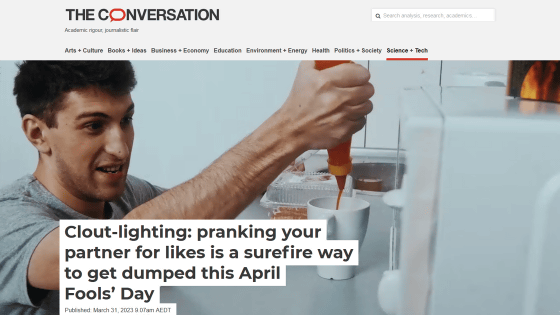If you want to go viral on SNS and play extreme pranks on your lover, there is a high possibility that you will break up.

On SNS, ``videos of pranking friends and partners'' often go viral, but when I saw a prank that was too extreme, I became worried, ``Will the relationship between these two be okay in the future?'' There must be someone. In recent years, the act of `` clout-lighting '', which posts reaction videos on SNS by setting extreme pranks on partners, has become a problem, and Louise Grimmer, a senior lecturer at the University of Tasmania, Australia. summarizes the problem of krautlighting.
Clout-lighting: pranking your partner for likes is a surefire way to get dumped this April Fools' Day

Cloutwriting is a type of psychological abuse that makes victims doubt their own perceptions by harassing and presenting false information, and `` gaslighting '', which means having a social influence. is a coined word that combines The term was coined by British journalist Jessica Lindsay to describe the act of intimate partners playing extreme pranks on each other and posting videos of their reactions on social media.
While online pranks generally target people unrelated to the perpetrators, krautwriting is characterized by the involvement of intimate partners. And Grimmer and colleagues point out that what Krautwriting and online pranks have in common is that they tease and ridicule innocent targets to entertain viewers.
On the other hand, the difference between online bullying and krautwriting is that the motivation of those who engage in krautwriting is the desire to 'get attention and become popular on SNS', whereas online bullying is 'a pain to a specific individual.' It is a desire to give people something, and it abuses the anonymity of the Internet.

Filming and publishing prank videos has long been practiced on TV variety shows. However, Grimmer and others point out that the advent of social media has created a motive and a platform to publish it as a means for people to gain more attention and become popular. “Everybody can be a comedic celebrity today, and YouTube is full of them,” said Grimmer and others.
Publishing prank videos on YouTube and social media is an effective way to gain followers and popularity, but pranks can be overly aggressive in order to get more reactions. Some of the videos include ``
Of course, there is no problem if the video is intentionally produced with the consent of the person concerned, but it is a problem if it goes beyond the limits of entertainment and goes in the direction of promoting partner abuse. In recent years, there has been a growing concern about the mental burden that reality programs that closely follow the lives of ordinary people have on the performers. may have adverse effects.
Grimmer and his colleagues point out that viewers drawn to extreme entertainment always want an intense viewing experience, and tend to want more extreme as they become accustomed to prank videos. As a result, people engaged in krautwriting will continue to increase the number of views, so they will be forced to post more radical and humiliating videos for their targets.

According to a 2020 (PDF file)
`` Studies show that people perceive negative relationship humor as a sign of declining relationship satisfaction,'' Grimmer et al. In some cases, it can increase the level of perceptual anxiety in the relationship, which makes partners more likely to break up.'

Related Posts:
in Note, Posted by log1h_ik







